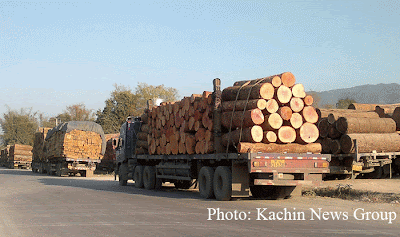 |
| CHINESE TRUCKS LOADING TIMBER FROM KACHIN STATE OF NORTHERN BURMA TEMPORARY STOPPED AT NONGDAO CAMP OPPOSITE NBAPA IN KACHIN STATE. PHOTO: KACHIN NEWS GROUP |
 |
| CHINESE TRUCKS LOADING TIMBER FROM KACHIN STATE OF NORTHERN BURMA TEMPORARY STOPPED AT NONGDAO CAMP OPPOSITE NBAPA IN KACHIN STATE. PHOTO: KACHIN NEWS GROUP |
A report released last month by the UK based Environmental Investigation Agency (EIA) says Chinese firms are continuing to heavily log the mountains of Kachin State and then illegally export teak logs across the border. This despite restrictions imposed by both the Burmese and Chinese governments to curb the underground cross border trade in timber.
The report titled “Appetite for Destruction: China’s trade in illegal timber” focused on the dubious business practices employed by Chinese firms when acquiring timber in Burma, Indonesia, eastern Russia, Mozambique and Madagascar. Posing as timber buyers undercover investigators from EIA were able to coax Chinese businessman into revealing crucial details about the global trade in illegally harvested timber.
EIA secretly recorded the Chinese businessman boasting how they were still able to obtain large amounts of timber from Kachin State including rare and endangered varieties of wood, easily circumventing rules designed to stop these practices. According to estimates cited by EIA the amount of illegally sourced timber shipped from Burma to China's southern Yunnan region for the first half of this year was 500,000 cubic meters.
“In Myanmar, they cut whatever species there is there. You know, you see a mountain that is covered in green ... the next morning when you wake up, it’s all just yellow soil. It’s illegal. It’s only because their Government is corrupt, so you’re able to pave the way using money. But so long as you pay the tax, then it’s legal. You know what I mean?”, revealed Tsai Rong head of the Kunming based Riyuan Timber during an undercover interview.
Another Kunming based timber trader described to IEA investigators the devastating impact of logging in northern Burma. “Over there, the environmental destruction is very bad. I’ve been there before. Even as a Chinese, it is quite heartbreaking to see it. The mountains ...just completely mined out ... mountain after mountain. It’s actually quite horrific”, the trader said.
EIA's interview with Li Conggen, field manager for the state owned China International Forestry Group (CIFG) exposed how Chinese firms bypass Western sanctions barring the import of timber from Burma. Standing in front of photos of company officials with senior representative of Burma's government Li told EIA researchers that Burmese timber is shipped from China via Singapore using “certificates of origin issued to mask Myanmar as their source.”
Video from some of the undercover interviews appears in a short film EIA has posted on the organization's website. The documentary which also includes other secretly recorded interviews in Mozambique and Indonesia was released to coincide with the publication of the report highlighting the role of Chinese timber firms around the world.
The massive growth in China's manufacturing sector over the past 20 years has led to China becoming the world's largest importer in black market wood, according to EIA. In 2006, following a series of widely publicized reports from Global Witness about the impact on Kachin State by Chinese firms logging practices, China and Burma's governments signed agreements restricting the flow of timber from across the Yunnan Burma.
Global Witness estimated that in 2003 900,000 cubic meters of illegal timber crossed the border from northern Burma to Yunnan, two-thirds of this came from Kachin State. According to Global Witness by 2005 this figure rose to an estimated one million cubic meters of timber. Although both the Chinese and Burmese governments were forced to act following the release of the Global Witness reports, it is uncertain how much of an impact the new rules actually had in limiting destructive forestry practices.
Under the rules imposed in 2006 officially approved log exports had to be shipped from ports in Rangoon with the approval of state owned Myanmar Timber Enterprise (MTE). Global Witness estimated that by 2008 there had been a 70 per cent reduction in the underground Yunnan Burma cross border timber trade. Although the rules meant that less wood was being shipped across the border large amounts of timber harvest ted in Burma was simply rerouted south through Burmese ports where it was then shipped to coastal China.
The latest figures cited by EIA suggest that the cross underground cross border trade in timber between Yunnan and Burma has picked up with half a millions cubic meters of timber estimated to have been shipped across the border during the first half of this year alone.

0 comments:
Post a Comment
Note: Only a member of this blog may post a comment.